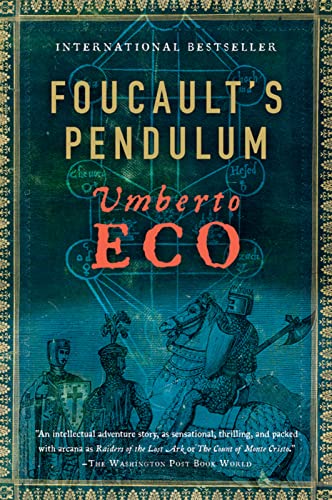Foucault’s Pendulum – Summary
Foucault’s Pendulum is a complex and intellectually stimulating novel that weaves together elements of conspiracy theories, historical mysteries, and philosophical musings. The story revolves around three editors working at a vanity press in Milan: Casaubon, Jacopo Belbo and Diotallevi. Initially sceptical of the occult manuscripts they encounter in their work, they decide to create their own elaborate conspiracy theory as a joke, which they dub “The Plan”.
The narrative begins with Casaubon, a young graduate student specialising in the history of the Knights Templar, who becomes involved with Belbo and Diotallevi at the publishing house. As they delve deeper into their fabricated conspiracy, they draw connections between various historical events, secret societies and mystical traditions, creating an intricate web of supposed hidden knowledge.
Their invented conspiracy gains unexpected traction when they encounter individuals who take their fabrications seriously. The lines between fiction and reality begin to blur as the trio becomes increasingly obsessed with their creation. They start to see connections everywhere, questioning whether their invented plot might have some basis in truth.
The story takes a dark turn when a group of occultists, led by a mysterious figure named Agliè, becomes convinced that Belbo possesses secret information about the Templars’ hidden treasure. Belbo is kidnapped and taken to Paris, where he is interrogated and ultimately killed at the Conservatoire des Arts et Métiers, home to Foucault’s Pendulum.
Casaubon, witnessing these events, flees to a countryside villa where Belbo spent his childhood. There, he reflects on the consequences of their intellectual game turned deadly serious. The novel concludes with Casaubon awaiting the arrival of the occultists, contemplating the nature of truth, belief and the human desire for meaning.
Throughout the narrative, Eco explores themes of knowledge, interpretation and the dangers of unchecked belief. The novel serves as a cautionary tale about the power of ideas and the fine line between intellectual curiosity and dangerous obsession.
Key themes:
- The nature of truth and reality
- The power and danger of conspiracy theories
- The human need for meaning and pattern recognition
- The blurred lines between fiction and reality
- The consequences of intellectual games taken too far
- The role of history and interpretation in shaping beliefs
Character Details
Casaubon
Casaubon is the protagonist and narrator of the novel. A young graduate student specialising in the history of the Knights Templar, he becomes deeply involved in the creation of “The Plan”. Casaubon is intellectually curious and somewhat naive, initially approaching the conspiracy theory creation as an amusing intellectual exercise. As the story progresses, he becomes increasingly entangled in the web of fabrications, struggling to distinguish between reality and the fiction they’ve created. His journey from sceptical academic to paranoid believer mirrors the novel’s exploration of how easily one can fall prey to conspiracy thinking.
Jacopo Belbo
Jacopo Belbo is a senior editor at the Milan publishing house and one of the key figures in the creation of “The Plan”. Belbo is a complex character, haunted by his past and driven by a desire to recapture a sense of meaning he experienced in his youth. He is initially cynical about the occult manuscripts he encounters in his work but becomes increasingly obsessed with the conspiracy theory he helps create. Belbo’s character arc is tragic, as his involvement in “The Plan” ultimately leads to his death at the hands of those who believe he possesses secret knowledge.
Diotallevi
Diotallevi is the third member of the trio creating “The Plan”. He works at the publishing house with Belbo and Casaubon. Diotallevi is particularly interested in the Kabbalah and brings this esoteric knowledge to the construction of their conspiracy theory. As the story progresses, Diotallevi develops cancer, which some interpret as a consequence of their meddling with cosmic forces. His illness and eventual death serve as a poignant reminder of the real-world consequences of their intellectual game.
Agliè
Agliè is a mysterious and charismatic figure who becomes involved with the protagonists. He claims to be an expert in various esoteric traditions and presents himself as a centuries-old being. Agliè leads a group of occultists who become convinced that Belbo possesses secret information about the Templars’ treasure. His pursuit of this supposed knowledge drives the novel’s climactic events, highlighting the dangerous consequences of belief in conspiracy theories.
Amparo
Amparo is a Brazilian woman who becomes romantically involved with Casaubon. She is described as a nature lover with strong Marxist leanings. Amparo’s character represents a connection to the real world and practical concerns, contrasting with the increasingly abstract and paranoid world of the conspiracy theorists. Her relationship with Casaubon is strained by his growing obsession with “The Plan”, and she ultimately leaves him after a disturbing experience during a magical ritual.
Reader Fit
Foucault’s Pendulum is an ideal read for those who enjoy intellectually challenging novels that blend historical fact with fiction. It would appeal to readers interested in:
- Conspiracy theories and their cultural impact
- Historical mysteries, particularly those involving secret societies
- Philosophy and semiotics
- Postmodern literature that plays with the concept of reality and fiction
- Complex, multi-layered narratives that reward close reading and re-reading
The book is particularly suited for those who appreciate novels that require active engagement and are willing to grapple with complex ideas. It’s not a light read, but it offers rich rewards for those willing to invest the time and mental energy to unpack its many layers of meaning.
CEFR Classification and Learning Suitability
Estimated CEFR Level: C2 (Proficiency)
Foucault’s Pendulum is a complex and intellectually demanding novel with sophisticated language, suitable for proficient learners.
- Vocabulary: The vocabulary is highly advanced, including specialised terms from history, philosophy, occultism and conspiracy theories.
- Grammar and Structure: Sentences are often long, complex and layered, requiring careful reading and strong comprehension skills.
- Themes: The novel explores themes of knowledge, truth, secrecy and interpretation, presented through a dense and intricate narrative.
- Dialogue and Style: Dialogue is formal and richly detailed, contributing to the novel’s cerebral and mysterious atmosphere.
Recommendation:
This book is recommended for proficient learners who enjoy challenging literary works with deep intellectual and philosophical content.
Quick Facts
- Genre: Postmodern novel, Conspiracy fiction
- Publication Year: 1988 (original Italian), 1989 (English translation)
- Reading Time Estimate: 20-25 hours (based on average reading speed)
- Notable Awards: Nominated for the Premio Strega (Italy’s most prestigious literary award)
Related Books
- “The Name of the Rose” by Umberto Eco – Another complex historical mystery by the same author.
- “The Da Vinci Code” by Dan Brown – A more accessible thriller dealing with similar themes of historical conspiracy.
- “The Illuminatus! Trilogy” by Robert Shea and Robert Anton Wilson – A satirical take on conspiracy theories and counterculture.


